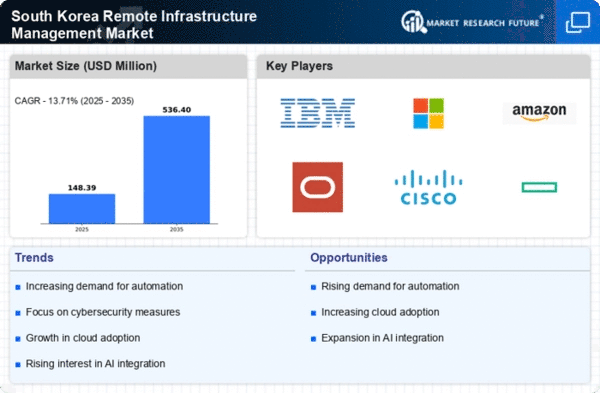Rising Need for Scalability
In South Korea, the remote infrastructure-management market is witnessing a rising need for scalability. As businesses expand, their infrastructure requirements evolve, necessitating flexible management solutions. Companies are increasingly adopting remote management tools that allow them to scale their operations seamlessly. This adaptability is crucial for organizations aiming to respond to market fluctuations and customer demands. Data indicates that approximately 60% of businesses prioritize scalable solutions when selecting infrastructure management services. This trend highlights the importance of scalability in driving the growth of the remote infrastructure-management market, as firms seek to future-proof their operations.
Growing Demand for Cost Efficiency
The remote infrastructure-management market in South Korea experiences a notable surge in demand for cost efficiency. Organizations are increasingly seeking solutions that minimize operational costs while maximizing productivity. This trend is driven by the need to optimize resource allocation and reduce overhead expenses. According to recent data, companies that implement remote infrastructure management solutions can achieve cost savings of up to 30%. This financial incentive encourages businesses to adopt these technologies, thereby propelling the growth of the market. As firms strive to remain competitive, the emphasis on cost-effective solutions is likely to continue shaping the landscape of the remote infrastructure-management market.
Enhanced Focus on Compliance and Regulations
The remote infrastructure-management market in South Korea is significantly influenced by an enhanced focus on compliance and regulations. As data protection laws become more stringent, organizations are compelled to adopt management solutions that ensure compliance with local and international standards. This regulatory landscape creates a demand for remote infrastructure management services that can provide robust security and compliance features. Recent statistics suggest that compliance-related investments in IT infrastructure have increased by 25% over the past year. Consequently, the emphasis on regulatory adherence is likely to drive the growth of the remote infrastructure-management market as businesses seek to mitigate risks associated with non-compliance.
Technological Advancements in Remote Monitoring
Technological advancements play a pivotal role in shaping the remote infrastructure-management market in South Korea. Innovations in remote monitoring technologies enable organizations to manage their infrastructure more effectively and efficiently. The integration of IoT devices and advanced analytics tools allows for real-time monitoring and proactive management of resources. This technological evolution is expected to enhance operational efficiency and reduce downtime. Market data indicates that the adoption of advanced monitoring solutions has increased by 40% in the last year. As these technologies continue to evolve, they are likely to further propel the growth of the remote infrastructure-management market.
Increased Emphasis on Business Continuity Planning
In South Korea, there is an increased emphasis on business continuity planning within the remote infrastructure-management market. Organizations are recognizing the importance of maintaining operational resilience in the face of potential disruptions. This awareness drives the demand for remote management solutions that facilitate effective disaster recovery and continuity strategies. Recent surveys indicate that over 70% of businesses prioritize continuity planning in their IT strategies. This focus on resilience not only enhances operational stability but also fosters confidence among stakeholders. As a result, the emphasis on business continuity is likely to be a key driver in the growth of the remote infrastructure-management market.

















